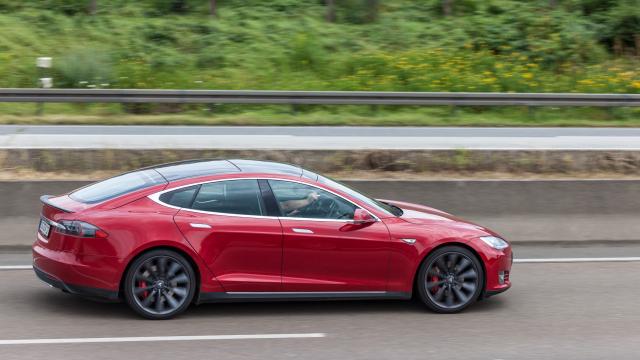In late March Tesla announced that it was issuing a voluntary recall on some of their Model S cars. The ACCC has just published the recall in Australia, including a note on repairs. But there’s just one small problem… new parts aren’t available.
The recall affects Select MY 2012 – MY 2016 Tesla Model S Electric Vehicles built with Bosch steering racks between May 31 2012 and April 9 2016.
The ACCC website states that, “In some Model S vehicles when exposed to long-term, high-corrosion environments, the aluminum bolts that attach the power steering gear assist motor to the gear housing may corrode and weaken. If these bolts fracture, the power steering gear assist motor may move, causing the transmission belt to slip and resulting in reduced or lost power steering assist.”
The corrosion could result in reduced or lost power steering assist, particularly at lower speeds.
Information provided to Gizmodo from Tesla indicates that the reason for the voluntary recall is to retrofit the power steering component. However, it’s unlikely that Australian owners have or will experience an issue, as it has only presented in very cold winter climates. To date, there hasn’t been any accidents or injuries related to the component.
Australian Tesla customers are being offered free repairs on their affected vehicles, however, the parts won’t be available until “mid-2018.” No further clarification around dates have been provided.
Below is an email that has been sent to Tesla customers.
In order to ensure your safety, Tesla will proactively retrofit a power steering component in all Model S vehicles built before April 2016. (No other Tesla vehicles are affected.) There have been no injuries or accidents due to this component, despite accumulating more than a billion miles of driving.
To be clear, this recall does not apply to any Model X or Model 3 vehicles, only to Model S vehicles built before April 2016.
We have observed excessive corrosion in the power steering bolts, though only in very cold climates, particularly those that frequently use calcium or magnesium road salts, rather than sodium chloride (table salt). Nonetheless, Tesla plans to replace all early Model S power steering bolts in all climates worldwide to account for the possibility that the vehicle may later be used in a highly corrosive environment.
If the bolts fail, the driver is still able to steer the car, but increased force is required due to loss or reduction of power assist. This primarily makes the car harder to drive at low speeds and for parallel parking, but does not materially affect control at high speed, where only small steering wheel force is needed.
Our records show that you own a Model S affected by this voluntary recall. At this time there is no immediate action you need to take and you may continue to drive your Model S. Tesla will contact you to schedule an appointment when parts are available in your region. The retrofit will typically take around an hour.
You can check the VIN list here if you’re unsure if your vehicle is affected.
